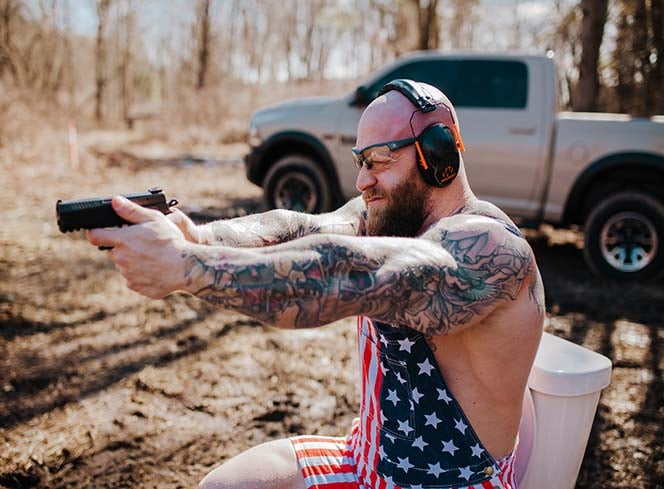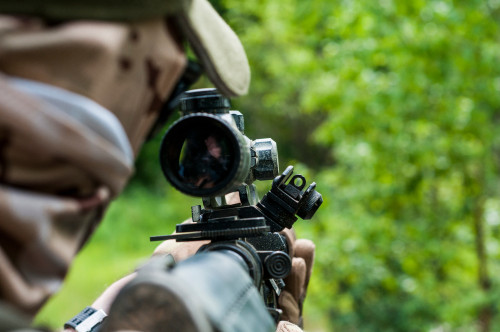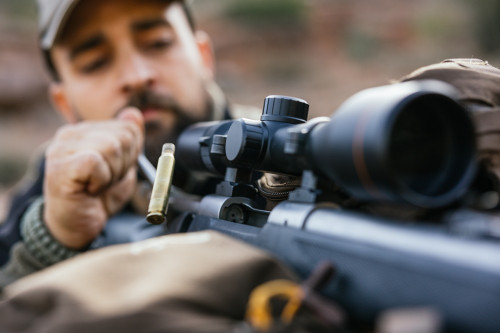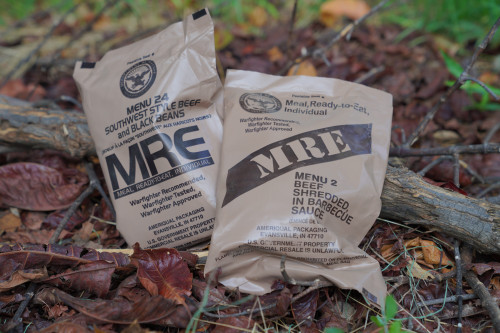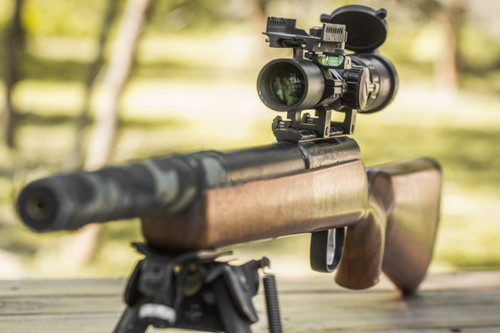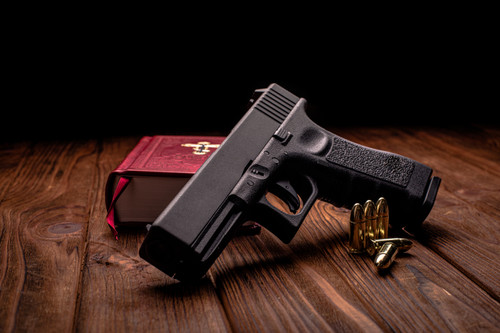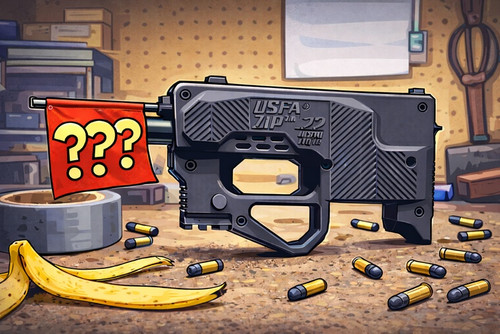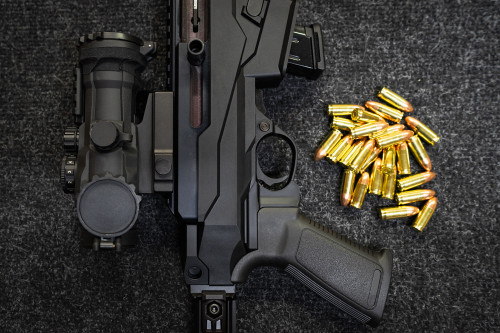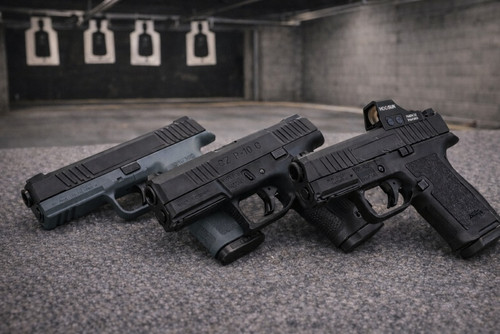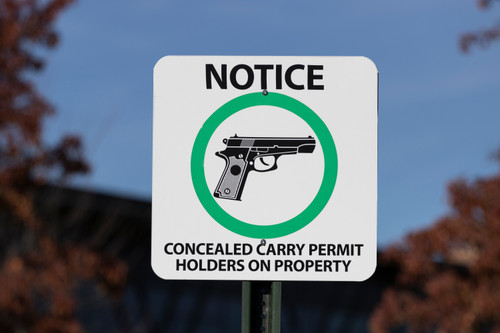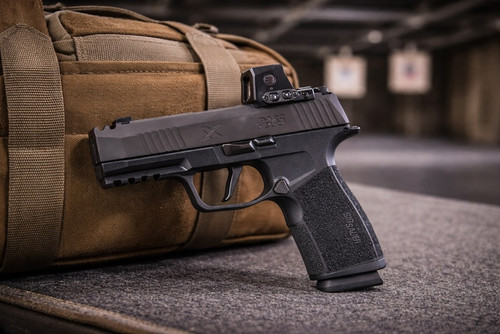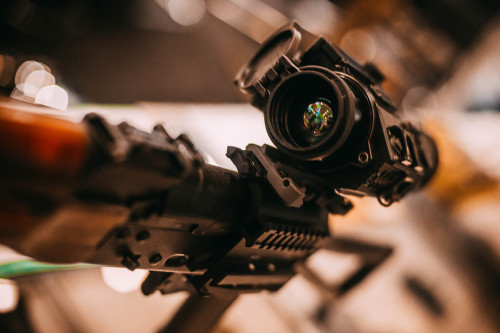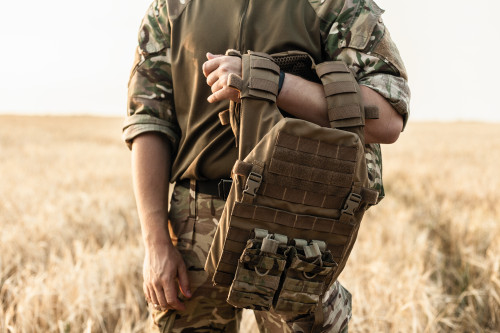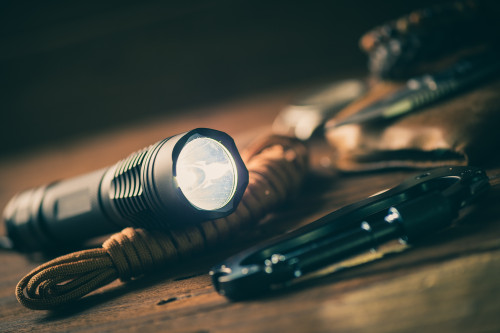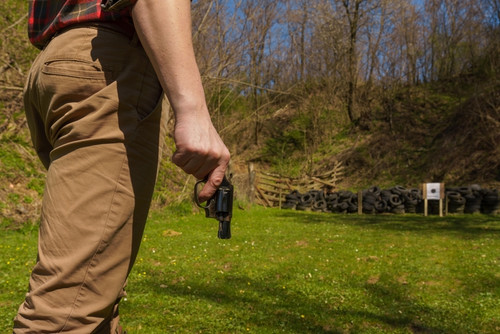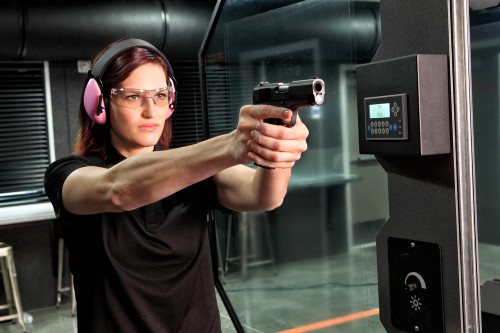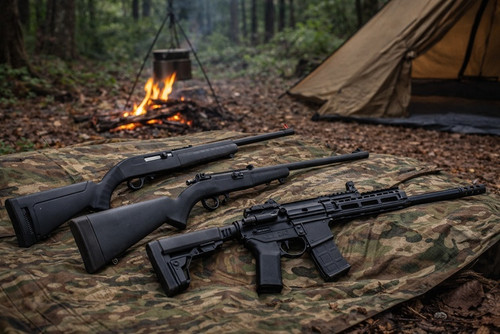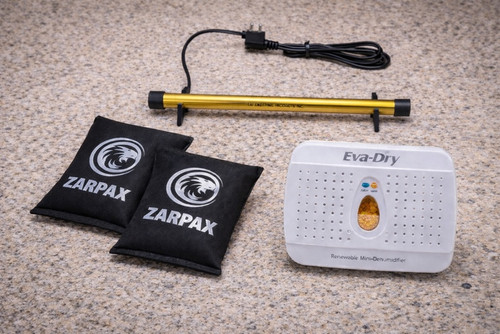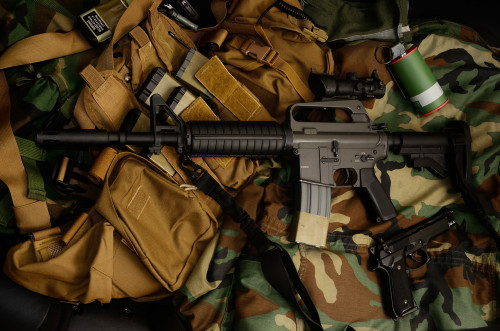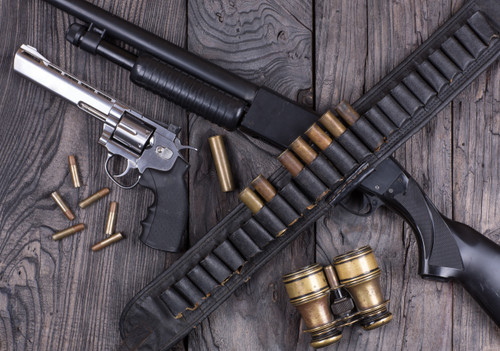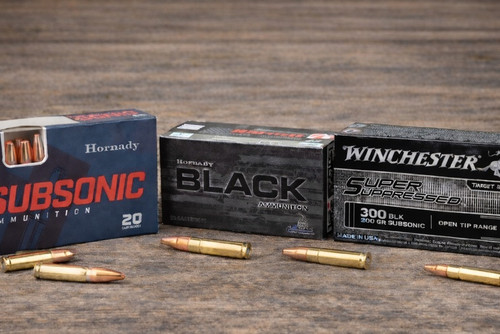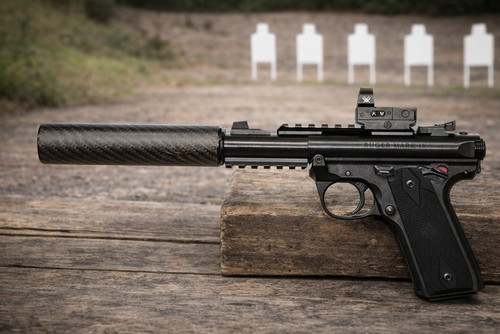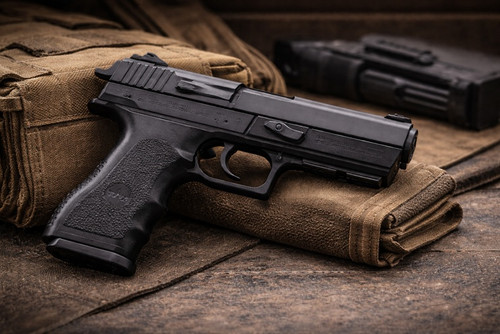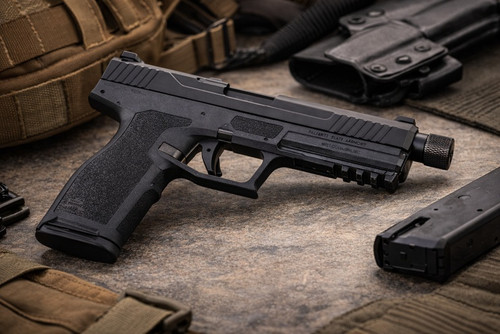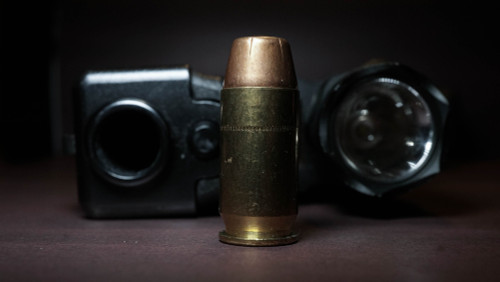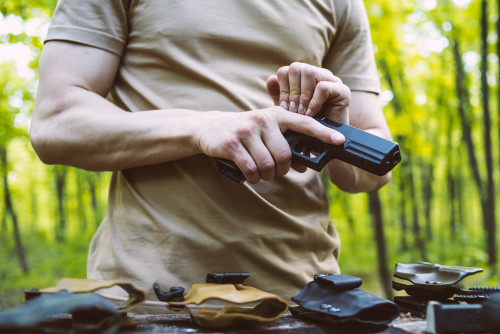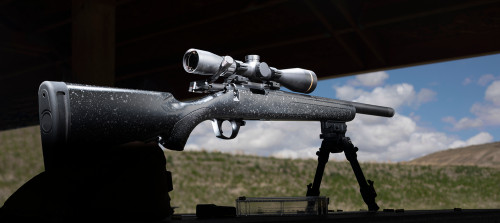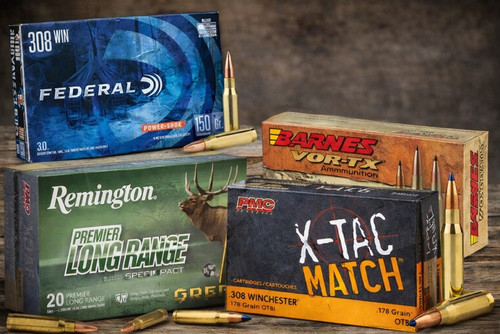Despite what the media would have us believe, modern society is a pretty safe place to live. If we ignore the constant barrage of doom, we can see the world is less violent and less desperate than it has been at any other time in human history. Through sheer odds alone, most people will never encounter serious violence in their lifetime.
But, just because violence is unlikely, that doesn’t mean we shouldn’t prepare for it. If one day violence comes slithering onto your doorstep, you need to be ready to take action — you may be the only one who can. When every second counts, the police are often many minutes away (or longer in rural areas).
Home defense isn’t some kind of gunplay fantasy — it's a harsh reality that everyone (especially families) need to face. You might need to defend your home from any number of human threats, from common burglars to true monsters. If that day comes (and pray that it won’t), you can bet you won’t feel like Scarface mowing down his enemies with confidence. It’s a situation as grave and haunting as going to war.
To help you prepare for the worst, let’s dive into some of the key principles of home defense preparation and tactics. Then, we’ll run a thought experiment to see how those tactics might apply in a real home defense scenario.
What Is Home Defense?
A common misconception is that home defense requires surprising burglars and blasting away like a suburban commando. The reality is, home defense means doing everything we can to avoid this scenario in the first place.
Consider a fire extinguisher. You’re not going to let your kitchen catch on fire just so you can heroically extinguish it in a dramatic cloud of sodium bicarbonate. The fact is, if you need to use the fire extinguisher, something went horribly wrong. Avoiding the fire in the first place is the optimal solution.
Using a gun for home defense is the same. We hope we never need it, but we need to have it ready, just in case. Instead, our main focus should be making the necessary preparations that minimize the likelihood of a home defense situation arising.
Of course, nobody can tell you exactly how to defend your home. There are too many variables to offer specific meaningful advice for every scenario. Instead, we’ll focus on general principles and tactics that you can use to help make your homes and families safer.
Preparing for Home Defense
The key to home defense is preparation. You must understand the threat, make a plan, and prepare your home, your tools, your family, and yourself.
Understand the Threat
Before we cover how to defend your home, think about who you’re defending it from.
- Trespassers: First, consider genuinely innocent trespassers such as someone with a mental disability who might be lost, your neighbor sleepwalking on Ambien, or some drunk person who thought his wife locked him out (who then broke into the wrong house). While these people might not be a threat, you want to keep them out for their safety as well as your own.
- Burglars: Most home invaders are looters or petty criminals trying to exploit an opportunity. They might be looking for cash, electronics, prescription medication, or other valuables. Fortunately, this type is fairly easy to deter by simply making your home a hard target.
- Monsters: Finally, be prepared to face genuine psychopaths. While rare, they are out there, and you must be ready to stand between them and your loved ones — with force if necessary.
Make a Plan
As the saying goes, “no plan survives first contact with the enemy.” In other words, conflict is complicated and unpredictable. So, why bother planning? Because the planning process forces you to analyze the problem and think through various possibilities. This analytical process prepares you for the chaos of conflict and to adapt when your plan inevitably fails.
With that said, always remember that a mediocre plan is better than no plan at all. The last thing you want to do is freeze during a conflict with no clue what to do next. You must start moving as soon as you perceive a threat, and having a plan makes this possible.
Prepare Your Home
Next, prepare your home to deter intruders of both the innocent and not-so-innocent variety. Start by analyzing your home from a criminal’s point of view. How would you attack your own house? Use this knowledge to make your home a hard target and prevent some idiot from making a mistake that could ruin both of your lives.
Consider the following aspects of your home defense setup:
- Lights: Set up motion-activated or continuous lighting to illuminate common avenues of approach or hiding places. If there’s nowhere to hide and no good way to sneak in, the crooks will choose another house.
- Cameras: Use real cameras and/or decoy cameras. Either way, they should be clearly visible. You’re not trying to hide or play gotcha. You want that intruder to know he is on camera so he’ll think twice before breaking in.
- Landscaping: A manicured lawnlets everyone know you’re an active homeowner who cares about your home and has probably taken steps to protect it. Plus, trimmed hedges help eliminate hiding places.
- Dogs: For millennia, dogs have served as our early warning systems — and they’re still great companions to this day. Despite what you see in movies, you don’t need a killer. You just need a yapper that can wake you up and scare away uncommitted intruders.
- Doors: Most criminals (and uninvited idiots) just walk through the front door, so make sure all doors are secured, preferably with deadbolts and chains.
- Windows: When your doors are locked, windows are the next obvious target, so make sure they’re closed and secured. Even if you’re sure they are, make it a habit to check regularly — especially if you have kids.
- Security system: While it won’t stop a determined attacker, a security system might scare off a burglar. Plus, it alerts you of the intruder more quickly while also notifying the cavalry.
- Valuables: Be careful about broadcasting what you own. If one of your kid’s friends starts blabbing about your rare comic book collection, the wrong person might hear about it and consider taking it off your hands. It’s best not to display expensive, valuable items in windows either. Keep these items out of view.
Prepare Your Equipment
Next, consider your gear. If a criminal gets through your home defenses, you may need to rely on your equipment, so make sure it’s always ready and maintained. Criminals rarely give you time to prepare.
Here are some key items that will help you survive a home invasion, listed roughly in order of importance. Don’t overcomplicate this. The more you have to do in an emergency, the more likely something will go wrong. Keep it simple!
- Phone: Generally, nobody needs to be told to keep their phone nearby and charged, but it’s worth mentioning. This is your critical lifeline to outside support.
- Gun: Choosing a gun is an entire article in itself, but the best gun for home defense is the one you are most comfortable and proficient with. If you’re not proficient with your gun, get training ASAP.
- Ammo: Hollow-point rounds are generally best for home defense as they increase stopping power and reduce penetration through walls. You can’t afford a stray round hitting a family member in another room.
- Flashlight: You need to see the intruder, but remember that flashlights work both ways, illuminating you as well as your target. Either way, you need to have one.
- Gun storage: This is a key component of home defense because if you can’t access your gun quickly, it’s useless. But at the same time, if you have small children, your gun can’t be too accessible, either. A good gun safe solves this problem by providing security and quick access when needed.
- Body armor: Useful both for yourself as well as your family, but whether you have time to strap on a bulletproof vest will be highly dependent on the situation.
- Suppressor: A suppressor helps reduce the loudness of the gun, more for your hearing health and your family’s than for some kind of surprise attack. Keeping a gunshot quieter may help keep your family calm in an otherwise tense situation. Pair a suppressor with subsonic ammo for an even quieter effect.
- Ear protection: Even suppressed guns are loud. If you get in a fight in an enclosed environment like a house, the sound can be debilitating. Having ear protection ready to put on can help you maintain effective communication both with the intruders and with your family.
- Other weapons: While it would be nice to have effective non-lethal options, they just aren't practical. The stakes are too high and you might only get one chance. A committed attacker isn’t going to run away from pepper spray.
Prepare Your Family
You need to prepare your family for this situation. While unpleasant, it’s better to practice home defense in the light of day than figure it out in the absolute chaos of a real scenario. Here’s how you can prepare for home defense together:
- Walkthroughs: It’s one thing to discuss what to do, but it’s better to physically act it out. This is why we have fire drills at school rather than just fire briefings. Practical demonstrations stick in our memory better than explanations — especially under stress.
- Code words: Develop code words for “danger,” “get to the safe room,” and other information you might need to communicate in a crisis. Code words will have instant recognition for your family but will momentarily confuse the intruders, possibly giving you a tactical advantage.
- Safe room: Safe areas of your house will depend on the floor plan. Is everyone spread out in a single-story home or are they clustered beyond a single, easily-defendable staircase? Sometimes it makes sense to have a specific safe room, other times it’s best to hunker down in place. Analyze your home to figure out the best place for your family in a crisis.
Prepare Yourself
As the primary defender, take the time to prepare yourself for the unlikely but realistic possibility of a home invasion.
- Know your home: Know which areas are obscured, which are safe, which walls are vulnerable to stray rounds, where someone could hide, etc. This is a huge tactical advantage to have over an intruder.
- Dry fire your home: Practice clearing your house when it’s empty using dry fire training. Again, there’s an advantage to practical walkthroughs. Elite military units and professional sports teams all do dry runs. You should, too. You can even use special dry fire training systems to enhance the experience with technology designed to gamify your routines and help you improve your technique.
- Emergency medical skills: Violence tends to produce injuries. While you don’t need to be an EMT, some key tactical combat casualty care (TCCC) skills could keep someone alive before the professionals arrive. Seek expert instruction on this.
- Tactical skills: If you have a gun, you must develop baseline tactical skills to defend effectively. You need to be able to reliably put rounds on target, clear your house solo, deal with malfunctions, use your flashlight with your gun, etc. Seek expert instruction on this also.
- Legal knowledge: Understand what is legally acceptable as a home defender in your state. In some cases, you might be morally and ethically justified, but outside the confines of the law. There’s no shortage of insane laws (and public officials) that could land you in legal jeopardy. As a general rule, do only what’s necessary to stop the threat — no more.
- Mindset: It’s horrible that anyone could be forced to defend themselves from a violent intruder, but that’s just the price of living in a society. You must develop the mindset ahead of time that you will do whatever it takes to protect your family. The moment of crisis is not the time to consider this decision.
Imagining a Home Defense Scenario
We’ve looked at the key preparations for home defense, now let’s consider a theoretical scenario and how these home defense tactics and principles might apply.
Something goes bump in the night. You wake up. What do you do?
You know the noise can’t be your sleepwalking neighbor or some random stranger because you definitely locked and secured the deadbolt before you went to sleep, as you always do. The only possibilities are:
- The cat knocked something off the shelf.
- Something unstable finally fell (dishes in a sink, books on a weak shelf, etc.).
- The old pipes are popping in the walls.
- There are intruders in your living room who bypassed your defenses.
Listen closely. Chances are the first three causes will only produce a single startling noise. If it’s D, you’ll likely be able to hear successive noises (whispers, footsteps, etc.) that confirm there is a person in your home.
Review your security camera footage. Imagine it reveals armed men approaching your house, bypassing your security system, and breaking through the front door. You are now in a home defense scenario.
Before you run out with guns blazing, work through these key steps:
Don’t Panic
This is easier said than done, of course, but it’s the most important factor in reaching the best possible outcome. Your effectiveness in this situation could have repercussions for the rest of your life. You can react emotionally at some point, but now is not the time. Right now, you need to focus.
Nobody truly knows how they’ll react in these situations, but preparation and rehearsal are the best tools you have to increase confidence and help you stay calm in a crisis. Staying calm is much easier when you know what to do next. Take some deep breaths and get ready.
Call 911
Grab your fully-charged and easily accessible phone and call 911. This is critical so you can mobilize emergency services as soon as possible. But remember, they can’t save you. They are minutes away at best and the intruders are here right now.
Explain to the dispatcher what’s happening — intruders are in your house, and you need immediate assistance. How much and how loud you can speak will depend on the logistics of the situation. Are the intruders right outside the bedroom door or are they two floors down?
Either way, a drawn-out conversation won’t help, so don’t cling to the dispatcher like a safety blanket. They can’t help you. However, leave the line open as 911 calls are recorded and can later be admissible as evidence in court. What you do and say in the next few minutes can have significant legal repercussions.
When calling 911, err on the side of caution. Obviously, you shouldn’t call every time a floorboard creaks, but if you have a reasonable suspicion of an intruder but lack direct confirmation, you’re better off making the call than waiting until it’s too late. Don’t cry wolf, but also don’t hesitate. Trust your instincts.
Arm Yourself
Next (or simultaneously while you’re on the phone) access your firearm and flashlight. You can do this easily because you’ve practiced this scenario. You know the condition of the gun and the flashlight, and they’re both readily accessible. You’re not fumbling around in the dark, spilling bullets all over the place, and generally acting like an amateur. You’re ready for this.
Execute Your Plan
Your plan will depend on a variety of factors such as the layout of your house, the number of people you’re protecting, where they’re sleeping, how old they are, etc.
Whatever the case, now is the time to use codewords or text messages to alert your family members and get them into their predesignated defensive positions. This might mean just hunkering down and locking their bedroom doors or hurrying to a designated safe room. Everyone knows what to do because you’ve practiced this before.
If you need to communicate verbally, the intruders are now aware of your presence, but hopefully your codewords will be confusing enough to give you an advantage.
Communicate With the Intruders
With your family secure, you now need to deal with the intruders. You need to loudly and clearly communicate three very important messages:
- The police are on the way.
- I have a gun.
- Leave now the way you came in.
Make sure you say them loud enough for both the intruders to hear and your phone to capture (still on the 911 call). This makes it clear you’re doing everything possible to avoid a confrontation.
This isn’t just for legal cover. Unless you're a genuine psychopath, the last thing you want to live with is shooting and killing a human being in your living room. Give these people every opportunity to peacefully conclude the scenario they chose to create.
If all goes well, they will have a change of heart, turn, leave, and run off into the night reconsidering their life choices — crisis averted.
If they remain, you know you’re not just dealing with opportunistic burglars. These people overcame every one of your security defenses and are now faced with an armed owner and incoming police — yet they choose to stay. You now know you’re dealing with committed criminals or genuine monsters.
Hold Your Defensive Position if You Can
If you planned correctly, you have the tactical advantage here. You’re in a solid defensive position and your family is secure behind you. While this is far from an ideal situation, it could be worse. Plus, this is your terrain, and you know it well. The intruders know next to nothing. If at all possible, stay put until the police arrive or the intruders wise up and decide to leave.
You may feel some desire for vengeance or restitution and want to pursue the intruders — don’t. Your family is counting on you. Pursuit of violence is not worth the risk. Again, if you can stay in your room or in your predetermined defensive position, do that.
Go on the Offensive if You Must
While a defensive position is optimal, it’s not always possible. Again, if you have a one-story house with bedrooms on the perimeter, the intruder might be in the living room between you and your kids. This is not an acceptable situation.
Even if the kids know to lock the door and hunker down, this situation cannot persist, especially if the intruder has made it clear that they don’t intend to leave. You must go on the offensive because any delay could lead to a worse outcome. You must get a gun between the intruders and your kids.
This is where your tactical training, dry fire, preparation, and walkthroughs become critical. Even though you’re on the offense, you have a tactical advantage because this is your terrain. You know all the cover, concealment, and angles of attack present in your house. Use these to your advantage.
Sometimes all it takes is a flashlight, some colorful language, and a muzzle to finally send intruders running.
If You Must, Fight
Finally, we arrive at the second worst outcome: killing an intruder. For a multitude of reasons, you want to do all you can to avoid this situation. However, this is now necessary to prevent the worst possible outcome: something terrible happening to your family. You are now all that stands between these two possibilities.
Remember that these goblins chose this situation, not you. There is zero room for sympathy or leniency for misunderstanding here. They ignored your security measures and your warnings. They have given you no choice, so you have a moral and ethical duty to act.
When you fight, use decisive, overwhelming force. You might think it’s morally superior to get in a fist fight rather than shoot these people. But what if you lose? Now, you’re unconscious, they have an extra gun, and your family is defenseless. This is not a situation you can afford. If you have to fight, you must win.
The key is doing everything possible to avoid the fight in the first place!
To be fair, overwhelming force doesn’t mean excessive force. Again, you must be aware of the legalities. Just because someone is in your house, it doesn’t mean it’s open season (even if you live in a state with castle doctrine). You still must be sure you act within the confines of the laws where you live. At the same time, don’t be too concerned with the legality at the moment as it may cause you to hesitate and not take decisive action. Do what you know you need to do to protect yourself and your family.
The Aftermath
Adrenaline is high during and after a fight, so injuries might not be noticed immediately. Be sure to check everyone for signs of trauma. Since you (hopefully) have basic TCCC knowledge and skills, you can treat your wounds or the wounds of others while waiting for the professionals to arrive.
While you may be thrilled that you just successfully defended yourself, it’s important to remember that the police have to deal with this situation as a possible crime — and you’re the one with the smoking gun. When questioned by the police, the best thing to do in most cases is to inform them you are willing and happy to comply (with your lawyer present).
Carefully investigate self defense laws in your area and be ready to hire an experienced self-defense lawyer should the situation require it.
Fortune Favors the Prepared
We hope this has given you a better understanding of the principles of home defense. If this discussion seems a little intense, that’s on purpose. This is serious business. In fact, as an armed civilian, there is nothing more serious than defending your home and your family, so it’s important to have a sober understanding about just how horrible these situations can be.
Many of us walk around with a fantasy in our heads about what we’re going to do when we face down the bad guy, but it rarely goes down that way. Sure, you were justified in taking the shot, but what if you found out the burglar was a minor or a pregnant woman, and not some sneering villain. This is the horrible reality of violence — it affects people in ways we can hardly imagine.
This is why preparation is so critical. Some lights, cameras, and an expensive deadbolt may be enough to prevent this scenario altogether. If so, that person can stay alive and you won’t have to live with the memory of ending their life. While you must be trained and competent with your firearm, do all you can to deter intruders so you never have to pull the trigger in the first place.
If you’re ready to develop a home defense plan, you’re going to need good self-defense ammo. Pro Armory has a complete selection of ammo for all your training and self-defense needs to keep your guns ready for action. Check out our handgun ammo section to find the rounds that are right for you.
If you’re looking for professional self-defense and tactical training from veterans and firearms experts, look no further. Our team at Pro Armory offers online training so you can drill for these exact scenarios in your own home — using dry fire and other techniques to make the situations as realistic as possible. Sign up for our newsletter to be notified when training officially launches.




